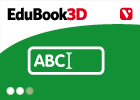Cargando...
Recursos educativos
-
Nivel educativo
-
Competencias
-
Tipología
-
Idioma
-
Tipo de medio
-
Tipo de actividad
-
Destinatarios
-
Tipo de audiencia
-
Creador
Lo más buscado
-

Evaluación final - Industrialización y sociedad en la España del siglo XIX
EduBook Organización
- 2449 visitas
En el siglo XIX se desmantelaron en España, como en el resto de Europa, las estructuras del Antiguo Régimen y se consolidó un modelo económico basado en la industria y el capitalismo. La sociedad…
-

El Bienio Conservador y el Frente Popular (1933-1936)
EduBook Organización
- 1 lo usan
- 2262 visitas
5.1. Los gobiernos de derechas La represión del levantamiento de Casas Viejas provocó una grave crisis al gobierno republicano-socialista y Manuel Azaña presentó su dimisión. El presidente de la…
-

Innate or acquired behaviour?
EduBook Organización
- 2448 visitas
There are two types of behaviours: innate and acquired. Animals have innate behaviours from birth. They do not have to learn them. Innate behaviours are automatic and cannot be changed, like coughing,…
-

Choose. Heat and temperature
EduBook Organización
- 2455 visitas
Choose the correct answer: What kind of energy is transformed into heat in a wood fire? Why do the handles of cookware tend to be made of plastic? What is a thermometer?
-

Match. Basic concepts of liberalism
EduBook Organización
- 2459 visitas
Decide which sentences refer to liberalism and which sentences refer to absolutism: The society is made up of free citizens whose fundamental rights and freedoms are guaranteed by the state. The society…
-

Complete. Democratic republic
EduBook Organización
- 2447 visitas
Complete the sentences about the Democratic Republic with the missing words: In June 1791, Louis XVI fled Paris to join the Austrian army; this event is known as the Flight of . The radical group known…
-

Look. French cartoon
EduBook Organización
- 2452 visitas
Look at the cartoon and answer the questions: Analyse the cartoon with a partner. The figure on the left is creating an 'electrical spark': What does the spark represent? Which monarchs are…
-

Spanish society in the 19th century
EduBook Organización
- 2458 visitas
The liberal revolution and the economic changes of the 19th century transformed Spanish society. However, the slow process of industrialisation, combined with the traditional values of the rural…
-

Initial evaluation T7 04 - Art in the 19th century
EduBook Organización
- 2452 visitas
Indicate whether the following statements are true (T) or false (F): Rococo is an artistic and decorative style which is characterised by its simple and austere forms. The values of Romanticism were the…
-

Neoclassicism
EduBook Organización
- 2458 visitas
Neoclassicism was a movement in Europe between 1760 and 1830 that was inspired by Enlightenment thought, the Revolution in France and the discovery of ancient archaeological sites during that period.…
Te estamos redirigiendo a la ficha del libro...













